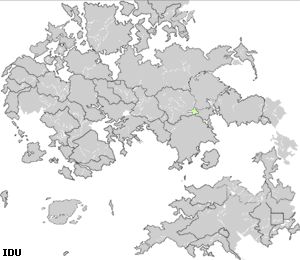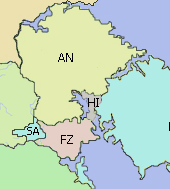South Antrium

| |
| Flag of South Antrium | |
| Motto: "In omnibus caritas" | |

| |
| Region | International Democratic Union |
|---|---|
| Capital | Nuvel Jérusalem |
| Official Language(s) | Alvésin, Aramaic |
| Leader | President Kàléo Wàrkor |
| Population | 145,000 |
| Currency | South Antrian Verino |
| NS Sunset XML | |
The Christian Republic of South Antrium (officially De Républîk Krîstîen do Antrîûm Sorét, as written in Alvésin) is a relatively new nation, founded by the right-wing organization of the Antrian Christian Society on May 18, 2006. The members of the ACS were upset about the more agnostic tendencies of the Antrian government, and wanted a place where they could live a Christian lifestyle. Their laws follow the codes of the Bible very closely, with as few modern additions as possible.
Contents
History
South Antrium was founded on May 18, 2006, when President of the Antrium Christian Society Kàléo Wàrkor declared their independence from Antrium. They chose a small area of land southwest of Antrium to settle and form a Christian state. Wàrkor believed that the Antrian government was discriminating against Christians, and ignoring their opinions, after Antrian Prime Minister Aranti Dévalera passed bills allowing abortions, same-sex marriage, and stem cell research.
People
According to the 2006 South Antrian Census, 100% of South Antrians are Christian (and 68% of those are Catholic), 84% are Caucasian, and 98% are heterosexual. 50.7% are women and 49.3% are men.
Their population was initially 145,000 members of the ACS, out of about 780,000 total. The population is expected to reach 12 million by 2007, as more of Antrium's 200 million Christians migrate to the country.
Location
</div>South Antrium is south of Antrium, in the eastern part of the International Democratic Union. Its capital is Nuvel Jérusalem.Leadership
Its first President is ACS President, and former Parliamentary representative of Du Lac County, Alvés-Navlan, Kàléo Wàrkor. He will stay in office until 2011, when they will have elections for a new leader.
Criticism
Antrian Opinions
South Antrium has been criticized by Antrians for discriminating against women, homosexuals, and minorities. South Antrian politicians have often made disrespectful comments towards these groups in speeches to the public, and have banned same-sex marriage and abortion. Women may not run for public office. Antrian Prime Minister Dévalera has said that "South Antrium has every right to run their country in any way they wish without interference, but if they should decide to take away the human rights of their citizens, I would not hesitate to intervene in defense of those citizens, and I hope I have Antrian support in this." Polls by The Antrium Beacon-Times show that 82% of Antrians agree with Dévalera. So far, Wàrkor's offenses have not been considered worthy of action, but Dévalera has encouraged Wàrkor to stop discrimination against these groups. So far, he refuses to change any laws.
International Opinions
On an international scale, the policies of South Antrium have been met with especially harsh criticism and sanctions by Baranxtu. After the founding of the republic, the Baranxtuan government recognized it only after Antrium did so, but in a rare unanimous vote, all members of the Baranxtuan parliament decided to refrain from initiating or responding to any diplomatic or economic contact with South Antrium. Subsequently, South Antrians are not allowed to trade with Baranxtuan citizens, nor may they enter Baranxtu.
Furthermore, South Antrium has been criticized by a number of leaders of various human rights organizations in Baranxtu, as well as by the Conference of High Priests of Ēmandē.
Opinion polls show that 94.3% of Baranxtuans aged 17 or older think that South Antrium should be forced to align their political stance with that of the majority of the IDU countries; in addition, 56.24% would support a military solution of the problem.

